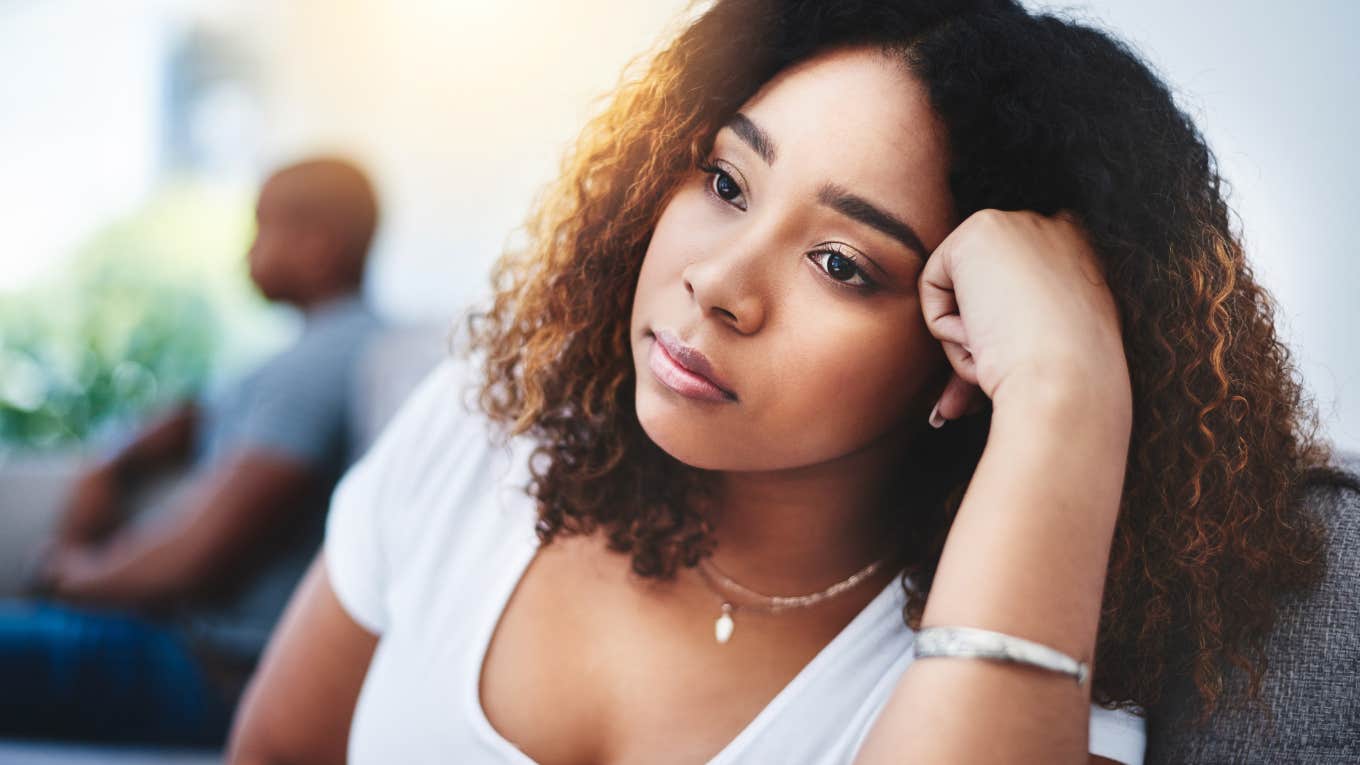5 Reasons You Married Someone Who Wasn’t Right For You, Says Clinical Psychologist
Sometimes, there is no path forward where both partners can feel close and genuinely connected.
 Peopleimages.com - YuriArcurs | Canva
Peopleimages.com - YuriArcurs | Canva Many people end up very unhappy in their marriages or marry someone who isn't right for them because they don’t know what to look for in a partner. They end up feeling trapped in an unhappy dynamic, having the same issues for years despite reading books and going to therapy, and/or divorcing in body or mind.
Here are the reasons you married someone who wasn't right for you:
1. You weren't healthy when you were dating
You had low self-esteem and felt that getting into a relationship would help you feel secure and better about yourself. Of course, you didn’t realize that having low self-esteem meant that you were ignoring red flags that you and your partner were incompatible.
It seemed to you that because you were unattractive/not that smart/unappealing romantically/disordered/came from a dysfunctional family, you would need to compromise on many things in a partner. You ended up compromising on basic compatibility.
2. You did not work on your family of origin issues and got into the same dynamic that you had with a parent
 Yuri A / Shutterstock
Yuri A / Shutterstock
This is called imago theory. We are subconsciously drawn to what is familiar to us. If you were treated dismissively by a parent, you will be drawn to a partner with dismissive tendencies and try to change them into someone attentive in a way our parent never was.
3. You outgrew your partner
Many people started being compatible with a partner, but then they worked on themselves or life experiences changed them into a very different person. For example, working partners and stay-at-home partners often grow apart because they have different experiences.
Also, partners that start dating when both have disorders such as alcohol abuse, depression, or anxiety often struggle when one partner’s mental health improves. Then, their codependent dynamic no longer functions, and the marriage has to change to survive, or end.
4. You wanted happy and healthy children and prioritized this over everything
In this post, I state:
There are reasons why certain people focus on their partner’s potential parenting ability and either consciously or subconsciously downplay the fact that they are not fully happy with their romantic relationship. Mostly, I see this in people who had a difficult childhood and were particularly disappointed in one or both of their parents’ ability to be present, reliable, and loving toward them.
For these people, finding a partner who is an excellent parent to your future children is of paramount importance. They try to tell themselves that providing a great mom/dad to their eventual kids is much more important than other things, like chemistry, emotional or intellectual compatibility, high conflict in the relationship, or incompatibilities in major areas.
This makes sense if your family of origin was so unhappy or cold that you assume that love is just a fairy tale. As you get older and more confident, and/or work on your negative and limiting beliefs in therapy, you may start to recognize that you deserve love, and love is possible. This often makes you much less satisfied in a marriage that was chosen mainly to benefit your eventual kids.
5. You met someone at a particularly vulnerable time in your life
 Nicoleta Ionescu / Shutterstock
Nicoleta Ionescu / Shutterstock
Often, when you meet a partner when you are feeling very unsteady and anxious, you prioritize someone stable over someone who is emotionally attuned, interesting, or with whom you experience an intellectual connection. This is a version of Maslow’s hierarchy of needs; when you do not feel secure at a basic level, you can’t think about higher-order needs like compatibility.
For example, if a teenager is trying to get out of an abusive family of origin, they frequently choose a stable partner with a loving family that “adopts” them. As they get older and more confident, they often realize that their vulnerable state made them choose a partner who isn’t very compatible with them on a deeper level. A good example of this is excerpted here:
I read your blog and it has many articles which help me more than any other internet resource. I’m in a weird place where my husband is a wonderful man but I do not love him. The sad thing is that it is his fault for being too good to me! Let me explain — when we met I was fresh out of an abusive relationship and my self-esteem was terrible.
Over the last 8 years, he has built me up to a point I never could have achieved on my own and I’ve become objectively successful in my career (so much so, that he has become a SAHD). Sadly though this has made me long for a partner that is more like I am now, which I feel is the “real me.” But without my husband,d I never would have found this “me” and I owe him everything!
If this post resonates with you, individual or couples therapy can help you figure out if there is a path forward with your partner. Often, you are disillusioned, but you can actively work to rebuild closeness in a new way.
However, sometimes, there is no path forward where both partners can feel close and genuinely connected. If your gut tells you that you never deeply loved your partner, individual therapy is a better choice than couples, as that is an environment where you can speak more freely without hurting your partner deeply.
Dr. Samantha Rodman Whiten, aka Dr. Psych Mom, is a clinical psychologist in private practice and the founder of DrPsychMom. She works with adults and couples in her group practice Best Life Behavioral Health.

